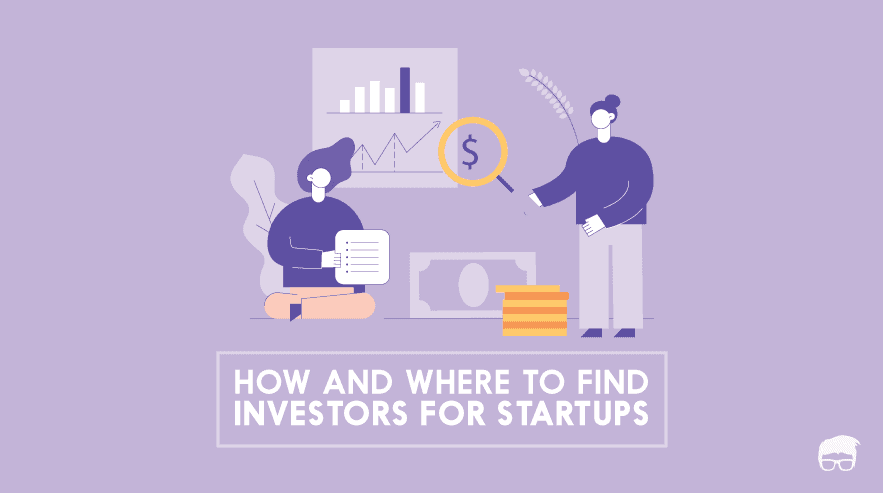If we consider starting up to be a video game, the investment phase is the boss level.
While getting to this boss level itself is the task, only a very few startups get past this stage. In fact, only 0.05% of startups succeed in raising venture capital.
But that’s another story. For now, let’s be optimistic and look at the positive aspects– over 10,400 companies received $133 billion in funding in 2019 in the USA alone.
So, if you’re a new entrepreneur unaware of the funding intricacies, here’s a comprehensive guide to help you find investors for your startup.
But before we start, answer this –
Which stage is your startup in?
Why, you ask?
Because each stage requires you to approach a different type of investor.
Pre-Seed Stage
- Startup’s operations are getting off the ground
- No real customer traction
- Test products (prototypes, proof of concepts, and MVP) are built to validate assumptions
- The average ticket size is low due to the nascent stage of the startup.
- The average investment by a single investor is less than $150,000
If we consider the startup business to be a plant, the pre-seed stage is actually what it sounds like – the stage when the business isn’t even started.
In this stage, you have a concept which is still under development. You need to convert this concept further into a feasible business. The process requires various assumptions, numerous tests, and in some cases, a bit of investment too.
But, since there is no business during the pre-seed stage, many investors try to stay away and wait till the founders turn the idea into a validated business.
But if we divide the sources of investment for startups according to the sub-phase of pre-seed, there’s a way for you to find an investor for your startup even when all you have is an idea. Moreover, there are a lot of benefits in for them, like lower investment/higher equity and getting the first-mover advantage by getting more equity than they would have in subsequent rounds.
Finding Pre-Seed Investment When All You Have Is An Idea Or Concept
Believe it or not, you require an MVP to prove your concept to anyone that you have a viable business concept. But in cases where you need funds to develop an MVP to generate funds further, here are the sources of investments you can look for –
FFF (Family, Friends, & Fools)
These are the people who want to support your project because they believe in you or your team. These are the people who are more willing to invest in the people behind the idea than the actual idea.
Such investments are more likely to be in the form of debts as there’s no equity in an idea. But such debt can be in the form of convertible debt, where debt converts to equity at some later date.
Debt Funding
Banks don’t invest in ideas, but they do invest in you based on your credit score. An early-stage investment for your business could be in the form of a personal loan from the bank.
Pitch Competitions
A pitch competition is a competition where you have a limited time to present your business idea in front of an audience and a jury.
While preferred for the post-MVP stage, there are many pitch competitions that are open for pitching just ideas as well. These startup pitch competitions are perfect for getting that little push you wanted to pursue your idea in both monetary and non-monetary terms.
Monetarily, these competitions can offer you benefits ranging from $5,000 to a few hundred thousand dollars.
There are numerous pitch competitions for every niche and every country.
All you need to do is Google “pitch competition” + “your country”

The best part about pitch competitions is that you can apply for as many as you want. But to ace these competitions, make sure your pitch deck has the following elements –
- Problem
- Opportunity
- Solution
- Product
- Competitor Analysis
- Business Model
- Unique Proposition/Key Highlight
- Team
P2P Lending
Peer-to-peer lending, also called social lending, is a new practice of obtaining loans from many individual lenders, eliminating the financial institution as the middleman.
Usually, these are unsecured personal ranging from $2K to $35K that can be obtained by verifying your personal and financial information on platforms like –
- Funding Circle
- Prosper
- Lending Club
- Peerform
- Upstart
Even though it is easier to get a loan from a P2P lending platform, the rate of interest could be as high as 35.99% APR depending upon your profile and trustworthiness.
Finding Pre-Seed Investment When Your Concept Is Validated
Developing an MVP and validating your problem-solution fit and product-market fit assumption opens the gates to a lot of investment sources. These include –
Incubators
Incubators are collaborative programs designed to help your startup develop during its initial stages until it is able to sustain itself in the market.
In simple terms, an incubator is a collaborative program consisting of investors and mentors to help your early-stage startup develop into a self-sustaining business. It can be a not-for-profit or a for-profit organisation backed by a university, government, or corporate that provides you with expertise and constant guidance and support from startup experts in all forms.
Most incubators, especially the academic ones, don’t provide you with funding but may provide you with a network of investors ready to invest in your early-stage startup. On the other hand, government incubators often provide you with investment as debt, while corporate and for-profit incubators invest (~ $10,000 to $150,000) in your startup in return for some equity.
Here’s where you’ll find startup incubators in –
If you reside in some other country, finding an incubator isn’t hard. Start with scouting for government incubators in your country online. Many of them are niche-focused and provide a great kickstart to your startup.
Besides this, Crunchbase is a great directory for incubators worldwide, but you may have to register for its premium account.
If you’re a student entrepreneur, you can also look for universities and institutions with good startup incubation centres that can help you with your startup.
But remember, even though incubators bring in good capital to your very early-stage startup, there’s a lot more to them. Always go for an incubator that has experience in incubating startups of your niche and can guide you better. Go for incubators that –
- Provides mentors and specialists that suit your niche and are beneficial for your startup.
- Is situated at a location that’s easily accessible for you as you’ll have to visit it often, if not daily.
- Has an educational curriculum with positive reviews from previous participants.
But never fix your eye on just one incubator. Startup incubators receive thousands of applications for a very few spots. The application screening is followed by interviews and other rounds as well. Hence, there are always chances of you getting rejected for one reason or the other.
Pre-Seed Angel Investors
Angel investors are high net-worth investors who provide initial capital for your startup, usually in exchange for convertible debt or ownership equity. Also called business angels, these investors trust you when others don’t and also provide you guidance on how to move ahead in the right direction.
But even such investors for startups seldom invest in pre-seed stages. Hence, you need to dig deeper into the special lists of angel investors who invest in the pre-seed stages.
Some places where you’ll find such investors are –
- AngelList’s List Of Pre Seed Angel Investors
- Investor Hunt’s List Of Pre-Seed Angel Investors
You can even perform the same drill as searching for the pitch competition. Just search “pre-seed investors” on Google, and you might get a good list of potential investors you can pitch to. Besides this, keep an eye on startup news and note which investors are investing in pre-seed stages so you can approach them as well.
Once you have a list, all you need to do is to send personalised emails to all. And if you can’t find their email address online, look for them on LinkedIn and send your pitch in the form of a message. An interested investor always replies and asks for a meeting. Do your research on the companies the investor has invested in before and get an idea of what he looks for in the pitch and mould your pitch differently for each investor.
Usually, pre-seed angel investors invest up to $500,000 in a concept. However, you might have to dilute a lot of your equity (10-30%) and might have a new member joining you in your board meetings if you go for such an investment.
Pre-Seed Venture Capitalists
A venture capitalist is a professional investor that funds startups and business ventures showing high growth potential in exchange for an equity stake.
Consider VCs to be a pool of money from different investors. And since it is a pool, it always invests big and is more cautious of its investments. This makes it very unlikely for VCs to invest in a pre-seed stage.
However, the trend is changing, and many VCs are emerging that do invest in the pre-seed stage. These are called micro VCs. Some of the VCs that do fund at pre-seed stage are –
- Notation Capital
- SV Angel
- Lerer Ventures
- Thrive Capital
- Brooklyn Bridge Ventures
- BoxGroup
- High Line Venture Partners
- Bee Partners
- Bold Start
- Initialized Capital
- Jumpstart Ventures
- K9 Ventures
- Landscape Capital
- Ludlow Ventures
- Right Side Capital Management
Other than this list, here’s an extensive list by Acceleprise. You can get a lot more recommendations by asking on forums like Quora or Reddit.
The best way to reach out to a venture capital firm is through mutual contact. But, if there isn’t one, every such firm has a website where they do mention the process of reaching out and pitching to them.
Seed Stage
- The concept is converted into a business, and the startup has started acquiring customers
- Average ticket size ranges from $100,000 to $2 million
The seed stage starts when your initial preparations end, and you have a proven offering that’s required in the market. The seed stage is when you have a business built around your offering and have started acquiring a few customers.
It is when your startup has started disrupting the market.
The challenges that you might face during the seed stage are –
- Final product development
- Manufacturing products at scale
- Penetrating into an existing market or creating a new market for your product (marketing)
- Building brand
- Building and growing the team
Unlike the pre-seed stage, raising funding during the seed stage is easier. In fact, most startups go for funding during this stage. The sources of investment for startups during the seed stage include –
Angel Investors & Venture Capitalists
Angel Investors are startups’ go-to investment source (< $1 million) during their seed stage. The process of finding and applying for investment is the same as it was for the pre-seed stage. But this stage gives you a better hand in researching and finding out exactly who could be interested in your startup idea. Do competitor research and find out angel investors who’ve recently invested in startups that belong to your niche. You can use information sources like –
On the other hand, venture capital is for those who require a lot of money (> $1 million) in their seed stage.
There are numerous articles and lists online like this, this, and this that will lead you to the venture capitalists that invest in seed-stage startups.
Accelerators
Startup accelerators or business accelerators help your developing startup grow by providing structured guidance, mentorship, access to investors and other support.
These are just like incubators but for grown-up startups.
These collaborative programs provide you with structured guidance and mentorship from the top leaders in your niche. Besides this, they also help you with –
- Resources focused on achieving increased growth within a short span. This includes infrastructure, mentorship, seminar, and workshops
- Funding in exchange for equity in the company ($100,000 to $500,000)
- Legal guidance
- Networking opportunity
However, just like every other investment source, you need to apply for the accelerators, which then screen your application and select you based on their predefined norms and standards. According to Forbes, only 1% to 3% of startups are usually selected by accelerators, and the process is done in batches (1-3 batches per year).
Accelerators and their selection criteria can easily be found online. Here’s the list of 100 startup accelerators by Crunchbase according to the continents served.
If you plan to apply to an accelerator, make sure you network and connect with their mentors and founders first, as most of them give some preference to the startups referred by these key members.
Crowdfunding
Crowdfunding refers to raising a small amount of money from a large number of people to finance your startup.
In the seed stage, when your product is ready, is presentable, and is feasible enough to earn money in future, you can go for these three options –
- Debt Crowdfunding
- Equity Crowdfunding
- Reward Crowdfunding.
Debt Crowdfunding
This is the business aspect of P2P lending. Now, since your idea is validated and you have a business in place, more individuals become interested in it. In fact, you may even get business loans ranging from $20K to $5 million with the help of debt crowdfunding. Here are some platforms that you can look for if you go for this type of investment for your startup –
- Funding Circle
- Lending Club
- Circleup
- GrowthStreet
- Localstake
- NextSeed
Reward-Based Crowdfunding
Reward crowdfunding is a practice where people contribute to a new project in return for a product or a service or rewards such as concert tickets, t-shirts, mugs, pens and coupons etc.
It works like this –
- You describe your startup idea or showcase your project on a crowdfunding platform
- You set specific rewards in return for every amount donated/invested. Usually, tiers are set for donations and each tier gets different rewards.
Some of the famous reward-based crowdfunding platforms are –
- Kickstarter
- Indiegogo
- Rockethub
Equity-Based Crowdfunding
Equity-based crowdfunding is just like an actual investment round. You raise funds and offer stock, future shares, or another security in return. However, instead of one big player, this equity is diluted among a lot of small players.
This type of crowdfunding isn’t legal in a lot of countries so you have to check before ticking this as an option to raise money for your startup. Moreover, if you operate in the USA, you need to study the two types of equity-crowdfunding that are provided by platforms in your country –
- Title II equity crowdfunding: means that your crowdfunding campaign can solicit investment only from accredited investors. The platforms which deal in this type of crowdfunding platforms are –
- Crowdfunder
- EquityNet
- AngelList
- Title III equity crowdfunding, or Regulation Crowdfunding: means that your crowdfunding campaign can solicit money from anyone.
- Start Engine
- Fundable
- WeFunder
No matter how enticing it may sound, equity crowdfunding, just like other forms of funding involves you to fulfil a lot of legal requirements. So make sure you consult a lawyer first before going forward to this source of investment for startup.
Growth Stage
The seed stage is followed by series A, B, C, and D funding which usually involve two parties –
- Venture Capitalists
- Big Corporates
While the process of finding and reaching out to venture capitalists remain the same, the new player – big corporates, require some more effort.
Big corporates like Facebook, Google, Amazon, etc. work on buy and expand philosophy. You need to plan an exit strategy right from the start if you look for big corporates to buy your startup or invest in it. And you need to build an offering that they see value in.
Reaching out to such companies is usually through relationships and connections so make sure you find some mutual connections who can set your meetings with the key people in these big companies.
Go On, Tell Us What You Think!
Did we miss something? Come on! Tell us what you think about our article on how to find investors for startups in the comments section.
A startup consultant, digital marketer, traveller, and philomath. Aashish has worked with over 20 startups and successfully helped them ideate, raise money, and succeed. When not working, he can be found hiking, camping, and stargazing.









